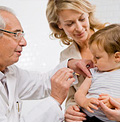 Research shows that parents look to other parents and to their doctor when they have questions about vaccination. The vast majority then decide stick to the recommended vaccine schedule.
Research shows that parents look to other parents and to their doctor when they have questions about vaccination. The vast majority then decide stick to the recommended vaccine schedule.
However, some parents deviate from the ideal immunisation programme, a fact that is of growing concern to medical experts.
The reason for concern over vaccinate drop-outs is simple. The entire community can be protected against diseases such as measles if 95% of children are immunised. But some children cannot be vaccinated because they have immune disorders or because they are too young.
This means that even though vaccinate rates can appear to be high, vaccinating nine out of 10 children might still be sub-optimal – meaning that not enough kids have been vaccinated to protect the weakest children in our neighbourhoods.
How can doctors help?
This week is European Immunization Week, an annual event run by the World Health Organisation. The aim is to improve vaccination rates by raising awareness of the vaccine-preventable diseases like measles and polio.
This year the spotlight is on how health professionals can help parents to work through any hesitation they may have when making important decisions about their children’s health.
You might ask why this is this even necessary. All doctors are champions of immunisation, right?
Alas, there have been questions raised about the role of doctors in providing guidance to parents on crucial issues like the safety of the measles vaccine.
On top of that, a study last year suggested younger doctors have grown complacent about the urgency of improving vaccine uptake.
This, according to the researchers behind the report, is largely due to the fact that the new generation of health professionals has probably never seen vaccine-preventable diseases such as pertussis or polio – because immunisation programmes have made these diseases a rarity in Europe.
Help is at hand
Understandably, not all busy doctors – many of whom deal with dozens of patients every day – have answers to questions about rubella, diphtheria or chickenpox, not to mention vaccine ingredients and the risk of not vaccinating.
That’s why WHO Europe has launched a new guide for how health professionals can discuss vaccination with parents.
This short paper helps doctors and nurses to understand how parents feel when faced with the prospect of vaccinating their child and equips them with strategies for answering questions they may be asked.
It features sample answers for discussing specific issues like the timing of vaccination, the number of vaccines recommended for children, vaccine ingredients, side effects, and even the (thoroughly debunked) study connecting vaccines with autism.
According to the guide, some parents are looking for hard scientific facts about vaccine safety while others appreciate anecdotes and the benefits of their doctor’s experience with vaccinating other children. Knowing how to balance science with storytelling is the key.
Crucially, doctors are advised to keep the conversation open even if parents refuse vaccination and to provide further reading material if required. Closing the door to questions opens the way for the return of vaccine-preventable diseases.
‘Talking to parents about vaccines for children’ by WHO Europe
Check out our special feature: 20 Questions about vaccination





VaccinesToday (@VaccinesToday) (@VaccinesToday) (@VaccinesToday) (@VaccinesToday)
April 23rd, 2012
Can #doctors address #parents’ #vaccine questions? http://t.co/MtU4i5GF #ImmunizeEurope @WHO_Europe #parenting #healthprofessionals
Chris Salter (@postpolionews) (@postpolionews) (@postpolionews)
April 23rd, 2012
Can doctors address parents’ vaccine questions? | Vaccines Today http://t.co/h8Bv0JQE #ppnews #polio @VaccinesToday